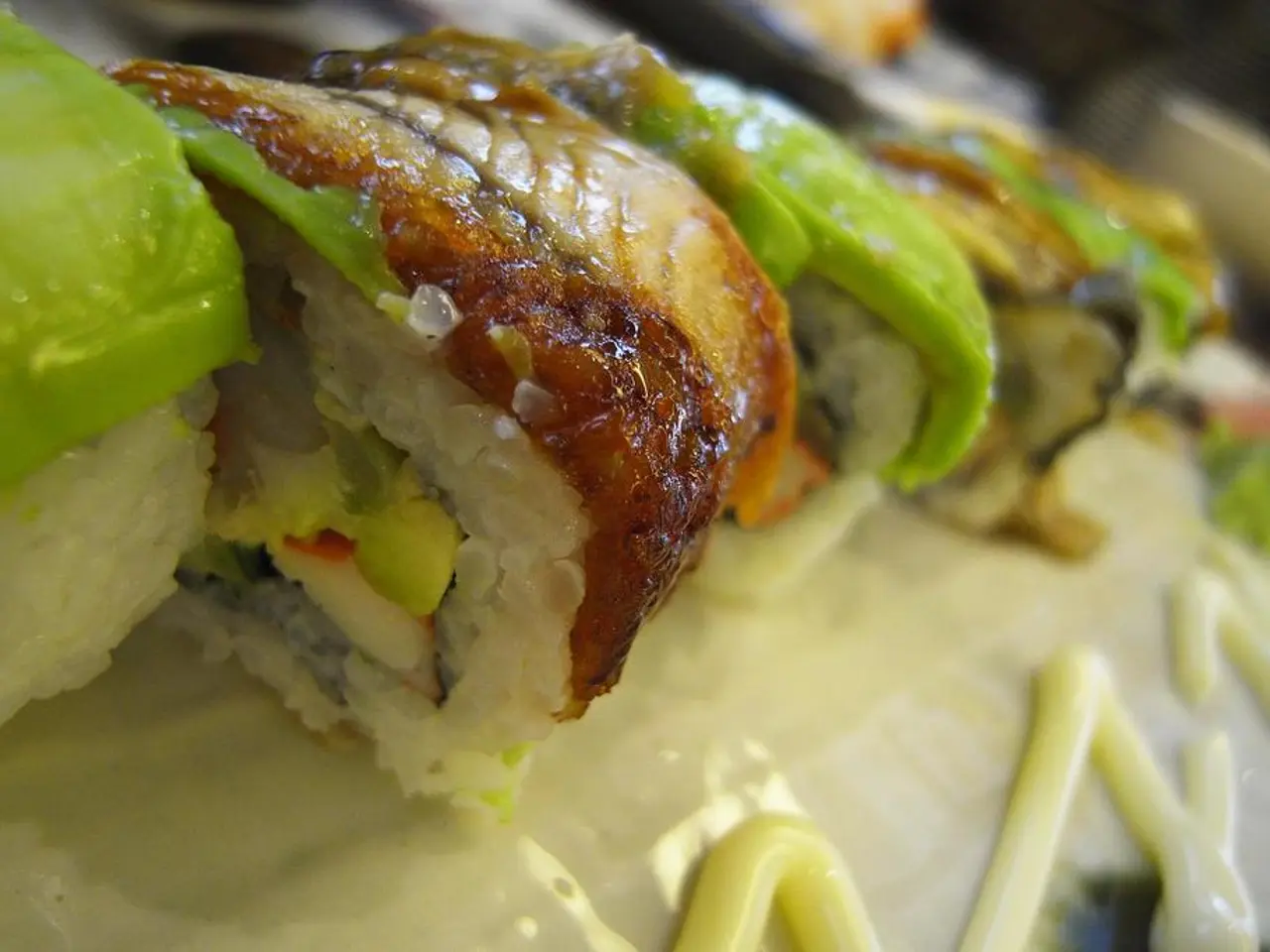Impact of Dietary Choices on Colorectal Cancer Susceptibility
Colorectal cancer, now one of the top causes of cancer-related deaths in people under 50, has become a significant public health concern. Fortunately, experts have identified several dietary and lifestyle changes that can help reduce the risk of this disease.
First and foremost, increasing fiber intake is crucial. By eating high-fiber foods such as fruits, vegetables, whole grains, nuts, and legumes, we can promote the growth of more "good" bacteria in our gut, improving digestion and potentially binding harmful compounds in the gut[1][4].
Consuming calcium-rich foods like milk, yogurt, tofu, and dark leafy greens is also recommended. Calcium may attach to harmful compounds in the gut, preventing them from damaging cells, and yogurt contains probiotics that can inhibit harmful gut microbes[1].
Experts also suggest following an anti-inflammatory diet, which overlaps with a heart-healthy diet such as the Mediterranean diet. This diet emphasizes leafy green vegetables, orange vegetables, fruits, whole grains, lean proteins, healthy fats, coffee or tea, especially green tea[2].
It's recommended to limit red and processed meats, sugary drinks, and other inflammatory foods, which can increase colorectal cancer risk[3]. Instead, choose fish, poultry, tofu, or legumes as your protein sources.
Regular screenings starting at age 45 are also crucial for early detection and prevention of colorectal cancer[6]. Additionally, maintaining a healthy body weight, staying physically active, and avoiding smoking and excessive alcohol are recommended to complement dietary changes[1][5].
Research suggests that calcium supplements may also be protective against colorectal cancer. Furthermore, following a diet that prioritizes fruits, vegetables, whole grains, nuts, and legumes, and avoiding processed meats and sugary drinks, can reduce the risk of not only colorectal cancer but also heart disease and Type 2 diabetes[7].
The exact cause of the uptick in colorectal cancer is unknown, but factors like obesity, smoking, alcohol use, lack of physical activity, and poor diet can increase the risk[8]. The recommended daily fiber intake is about 30 grams, which can be obtained through foods like an apple, broccoli, cooked quinoa, and cooked lentils[9].
Regularly consuming processed meats like deli meats, bacon, jerky, sausages, and hot dogs, as well as unprocessed red meats like beef, pork, and lamb, increases the risk of colorectal cancer[10]. Therefore, it's recommended to avoid processed meats as much as possible and limit red meat to one serving per week.
By making these dietary and lifestyle changes, we can not only reduce our risk of colorectal cancer but also improve our overall health outcomes[1][2][5]. It's never too late to start making healthier choices for a better future.
References:
[1] American Institute for Cancer Research. (2021). Colorectal cancer prevention recommendations. Retrieved from https://www.aicr.org/diet-nutrition/colorectal-cancer-prevention-recommendations.html
[2] American Cancer Society. (2021). Colorectal cancer diet and nutrition. Retrieved from https://www.cancer.org/cancer/colorectal-cancer/causes-risks-prevention/diet-physical-activity/diet.html
[3] World Cancer Research Fund. (2018). Food, nutrition, physical activity, and the prevention of cancer: a global perspective. Retrieved from https://www.wcrf.org/dietandcancer/recommendations
[4] Mayo Clinic. (2021). Colorectal cancer prevention: Can diet help? Retrieved from https://www.mayoclinic.org/diseases-conditions/colorectal-cancer/in-depth/colorectal-cancer-prevention/art-20048287
[5] National Cancer Institute. (2021). Colorectal cancer risk factors. Retrieved from https://www.cancer.gov/types/colorectal/hp/colorectal-risk-fact-sheet
[6] American Cancer Society. (2021). Colorectal cancer screening. Retrieved from https://www.cancer.org/cancer/colorectal-cancer/detection-diagnosis-staging/screening.html
[7] Harvard T.H. Chan School of Public Health. (2021). Diet and colorectal cancer. Retrieved from https://www.hsph.harvard.edu/nutritionsource/healthy-eating-plate/diet-and-cancer/diet-and-colorectal-cancer/
[8] Centers for Disease Control and Prevention. (2021). Colorectal cancer risk factors. Retrieved from https://www.cdc.gov/cancer/colorectal/basic_info/risk_factors.htm
[9] Academy of Nutrition and Dietetics. (2021). Fiber: the essential nutrient. Retrieved from https://www.eatright.org/food/nutrition/nutrient-rich-foods/fiber-the-essential-nutrient
[10] World Cancer Research Fund. (2018). Food, nutrition, physical activity, and the prevention of cancer: a global perspective. Retrieved from https://www.wcrf.org/dietandcancer/recommendations
- Increasing fiber intake is crucial in reducing the risk of colorectal cancer, as fiber promotes the growth of beneficial gut bacteria and potentially binds harmful compounds.
- Consuming calcium-rich foods like milk, yogurt, tofu, and dark leafy greens, and taking calcium supplements, may also help prevent colorectal cancer.
- Following an anti-inflammatory diet, such as the Mediterranean diet, can potentially decrease the risk of colorectal cancer due to its focus on leafy greens, oranges, fruits, whole grains, lean proteins, healthy fats, and green tea.
- Regular screenings starting at age 45, maintaining a healthy body weight, staying physically active, and avoiding smoking and excessive alcohol consumption are all recommended to complement dietary changes for colorectal cancer prevention.
- Limiting red and processed meats, sugary drinks, and other inflammatory foods can help reduce the risk of developing colorectal cancer.
- Regularly consuming processed meats like deli meats, bacon, jerky, sausages, and hot dogs increases the risk of colorectal cancer, so it's best to avoid them as much as possible and limit red meat to one serving per week.




